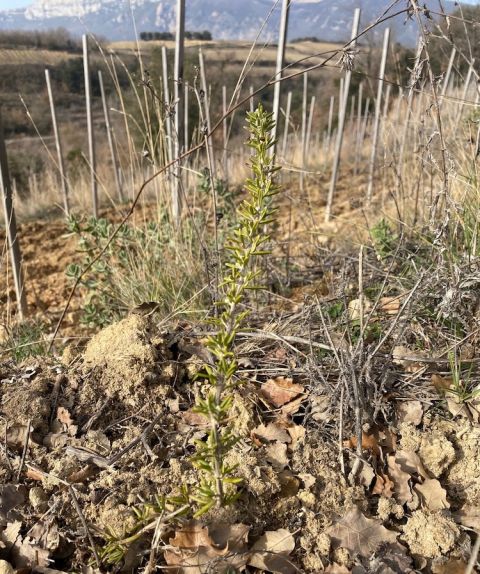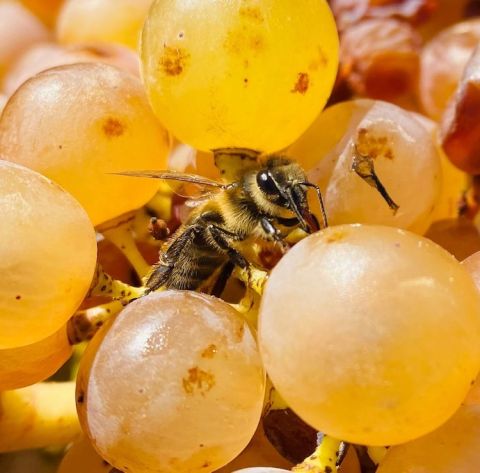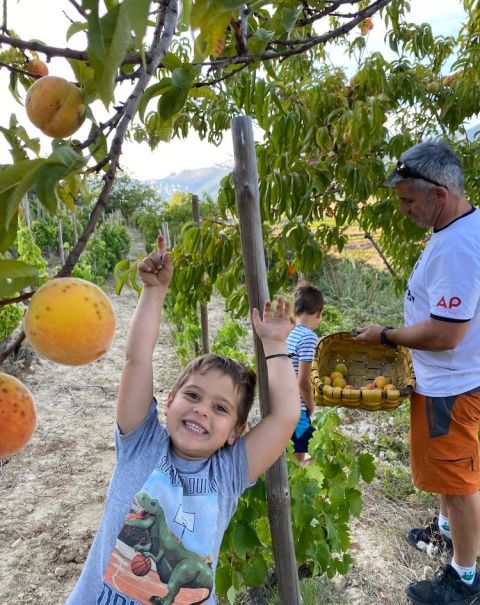Melanie Hickman writes My name is Melanie Hickman and I’m a North American native living in Rioja Alavesa. My husband, David Sampedro, and I have a quaint biodynamic winery in the village of Elvillar, named Bodegas Bhilar. Within the winery, I have my own vineyards and wines that I produce under a separate commercial name, Struggling Vines, which is also the name of a book I published shortly after our first son was born. This axiom personifies who we are, from humble beginnings to our shared journey built around a foundation of hard work to laying the groundwork in hopes that our children will embrace the same values. I am not a professional writer, rather I find writing cathartic and calming in a chaotic world. The idea of writing our story through my son’s eyes came to me one early morning while trying to settle him down from a nightmare. We make wine for pleasure, but our way of life is for their future.
———————————-
My name is Ian. I’m 7 years old and my brother, Kai, and I come from a really special place, on the outskirts of a small village named Elvillar in Rioja Alavesa. Mama and Papa are vine-growers with 16 hectares of biodynamic vines scattered around our village. We live on a little farm next to the winery. My parents love it because they have a two-minute walk to work. If you ever meet them, you will see they are very different. They say they have a strong common bond (other than us!) – a shared passion for the land. Mama has always been deeply concerned about the environment, but when she was young her Ego got the best of her and she lost her focus. Luckily, that fire in her was reignited by the chance encounter that brought her and Papa together before we were born. Mama tries to teach us respect for the earth and often speaks of Mother Nature. We call her “Mother of Nature” now, since her reaction of pure delight when I first called her that caused it to stick. She often tells us she’s sorry for her misguided ways and those of her generation, and says she’s come full circle and together with Papa, they will do everything in their power to make it up to us and our generation. She says the world needs more stewards of the land, and the mission of every person, especially farmers, should be to leave the earth better than they found it.
Mama says she fell in love with Papa because of biodynamic farming and wine in 2008. Papa teases her and says if she were honest, she would state that in the proper order… wine, and then biodynamic farming! When Papa isn’t around, Mama tells us a secret: She thinks Papa is a visionary. We think he may befriend that “Ego” character if we tell him, so we don’t repeat it. When Mama met him in 2008, he was practicing biodynamic farming, which was practically unheard of in our area at the time. Papa has always quietly taken the road less travelled. When my parents fell in love, they also married their love of hard work, hope, and action intended to spark positive change. After many years of making wine in their garage, they built a new winery and home in 2016, designed to perfectly mold into the landscape without harming anything. With a tiny budget, they tried to think up lots of creative reuse ideas, like using the limestone boulders dug up during construction as supportive structures around the property. Existing trees and flora went untouched. They planted more than 100 new trees and 1000 native plants and bushes around the property and surrounding vineyards. Today the energy for turning grapes into wine comes only from the sun and the wind, and we never need to connect to the electric grid! Our parents say it’s important to know where our food comes from, and it’s best if you grow it yourself, so we help in our vegetable garden so we can learn how. They’ve even set up something called a “water catchment”, and we give our food waste back to the earth as compost to help things grow.
In 2014, Mama and Papa met a wise man named Alfred, the instructor at class on how to farm with plow horses. Later that year they started working with Alfred and his three horses in hopes of eliminating the use of tractors. “Farming with horses makes you more conscientious and aware”, Papa explains. “You are more in touch with the land and attentive to the soil and conditions in the vineyard, forcing you to work the land only when necessary while preventing compaction of the soil.” They work the land very few times each year, and in vineyards with wider rows, a strip of weeds is left as a cover crop – a win-win, since the horses have less work and the land is left undisturbed. Papa tells us there is reason to hope. Many of the vineyards we rescue have been chemically mistreated by their previous owners due to their age and narrow rows that are too small for tractors. Because they were unable to turn the soil, the owners applied herbicides year after year to control the weeds. Whenever you see a dry brown moss covering a paper-thin layer of fragile topsoil, this is probably what happened. But nature is amazing, and has a keen ability to heal when left alone to do her magic. When we are called to help, we give Mother Nature a little head start by first removing all the chemicals and offering a gentle and shallow non-compacting till with the horses to let the soil breathe. She provides the water in the form of rain, as all of our vines are dry-farmed. We gently encourage the microbial process with biodynamic treatments such as BD 500 and Maria Thun (barrel preparation).
Nature is a powerful force when left to her own devices, and we’ve seen soils recover in as little as two years! The horses, Nina, Luna, and Venus, live on our farm and we use their manure to create compost for our garden and vineyards. When they’re resting, we ride these gentle giants. Mama says it’s good for the horses and our souls. We have dogs, cats, free-run chickens, and three geese that were brought in as lawnmowers, but have proved more efficient as guardians of the property. One of Mama’s favorite animals is actually an insect – the bees! We have four hives spaced out in various vineyards with enough biodiversity to provide them with forage. Biodiversity is super important for a balanced ecosystem … and our bees. Before the bees arrived, Mama and Papa planted massive amounts of lavender, rosemary, thyme, sage, and chamomile – all native to our region, they helped create a bee wonderland! Witnessing the resulting health and beauty of the diversity they created, they have used this same concept in many vineyards. One of our vineyards is planted on the side of a mountain in horizontal terraces. Brushy, sloped alleys separate the terraces of vines, and tall outcroppings of weeds grow up and suffocate the vines next to the border. The weeds need to be cut by hand, so Papa had an idea to plant creeping rosemary. He knew that once the root system took hold, the rosemary would creep down and cover the unwanted vegetation on the slopes while providing pollinator feed. They planted over 1000 creeping rosemary in this one vineyard. My parents always try to think like their grandparents’ generation, a time when people were more intuitive and listened to the land, and had long-term goals that would take care of future generations, rather than provide immediate gain. One year after planting the rosemary, my parents learned that rosemary and lavender contribute to Mychorizal fungi that assist in building a uniform root system and improve plant defense. They didn’t realize it during planting, but said it just felt like the right thing to do. Mama says this is called “intuition,” and it happens when we listen to nature and our hearts instead of what others are doing. She also is teaching us many different ways to provide food for the bees, as they are spiritual creatures and we humans could learn a lot from the hive mindset if we use our collective wisdom for the good of the planet.
Another example of my parents reflecting on the past to create a better future can be found in a vineyard of ours that is over 100 years old. It was planted during a time when diversity wasn’t seen as a threat, but considered beneficial for the ecosystem and the vine-grower. Historically you could find “melacotones secanos,” or dry peach trees, that needed no irrigation and were scattered throughout vineyards. These rustic trees produce a small peach unmatched in flavor. Sadly, Mama says they are becoming extinct in the area, something about not being “commercially viable.” The little peach trees were once planted among vines, as their lifecycle and needs were very similar to that of the vine. The farmer would tend to the trees alongside the vines, enjoying a symbiotic relationship: He would snack on the fruit while basking in the shade the tree provided. Today, air-conditioned tractors no longer value such respite from hot days, and so a piece of our past is disappearing due to “progress”. My mom the Mother of Nature set out on a mission to save this peach tree while increasing biodiversity. She lugged us to the vineyard every other day with a basket to collect the peaches. We collected every single pit after eating the delicious peaches so Mama could place them in buckets of soil outside hoping to mimic the natural cycle of the pit falling to the ground, passing the winter, and sprouting in the spring. To her delight (and ours, because we love seeing her happy), it worked! Now we have close to 75 peachtree saplings. When their root system is dormant this winter, she plans to separate the saplings in individual pots to be planted in vineyards where a vine has died or surrounding a vineyard that may need a bit of diversity. Some will be saved for the garden around the winery. Mom says she wants to be able to enjoy her trees every day on her walk to work as a reminder of the hope she’s planted for our future, a “regeneration for our generation.”
So that’s my family’s contribution not just to our future, but also to the future of all little ones out there. I hope that our story will be more common as I grow up. I hope that in my lifetime humans understand we are all connected on this earth and that everyone’s contribution to Mother Nature’s health is even more valuable than extracting her resources. Materialism has brought us a very exciting yet unsustainable future. Mom says there is wisdom in nature and many indigenous cultures understood this connection and listened to nature’s calls. Like the little voices inside us, she says, we must pay attention when nature asks us for help because her warnings are often overpowered by the noise of daily life. I hope our little story, while only a whisper, inspires you to do the same.
All images are the author's own.

















